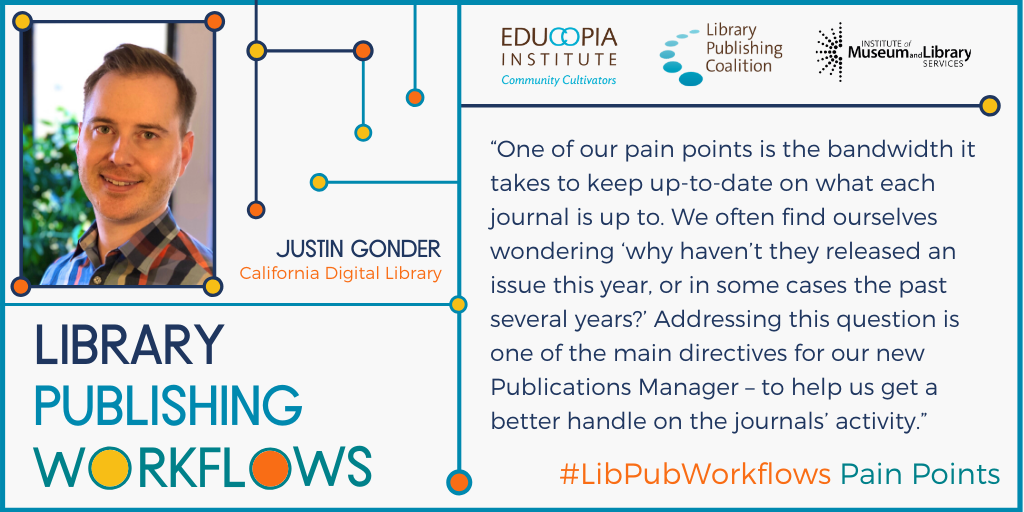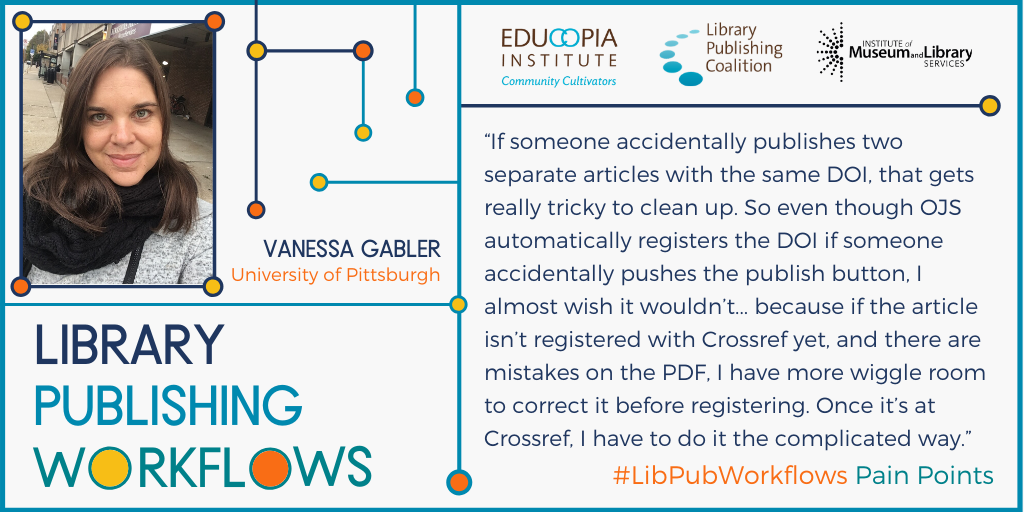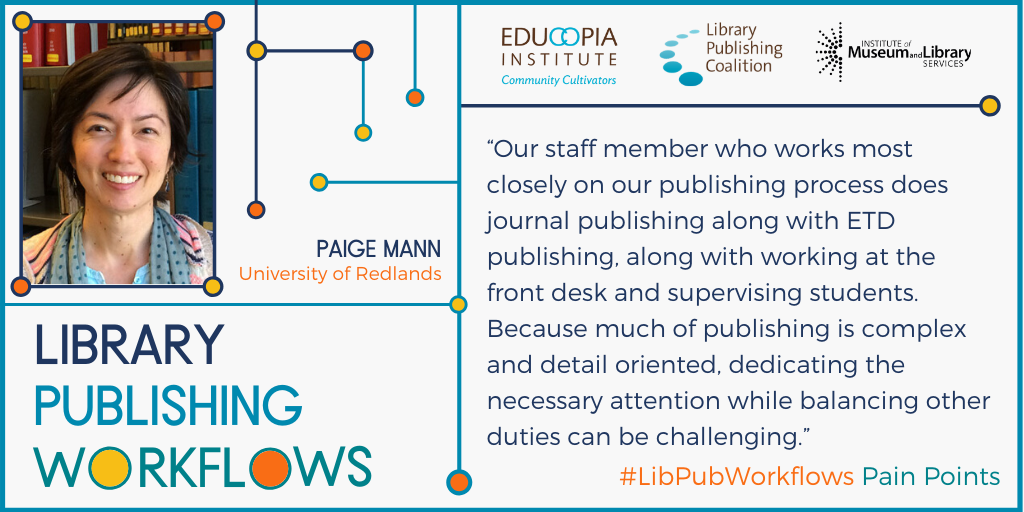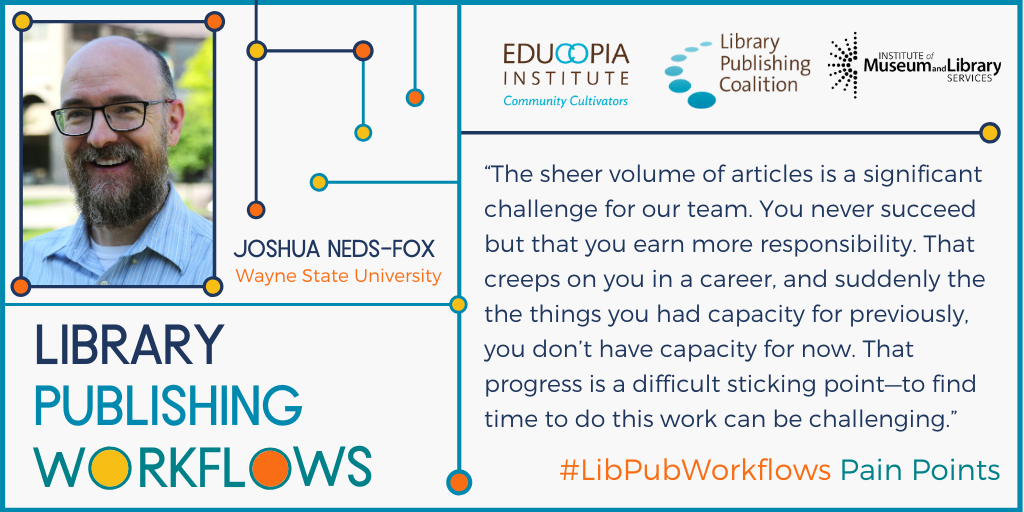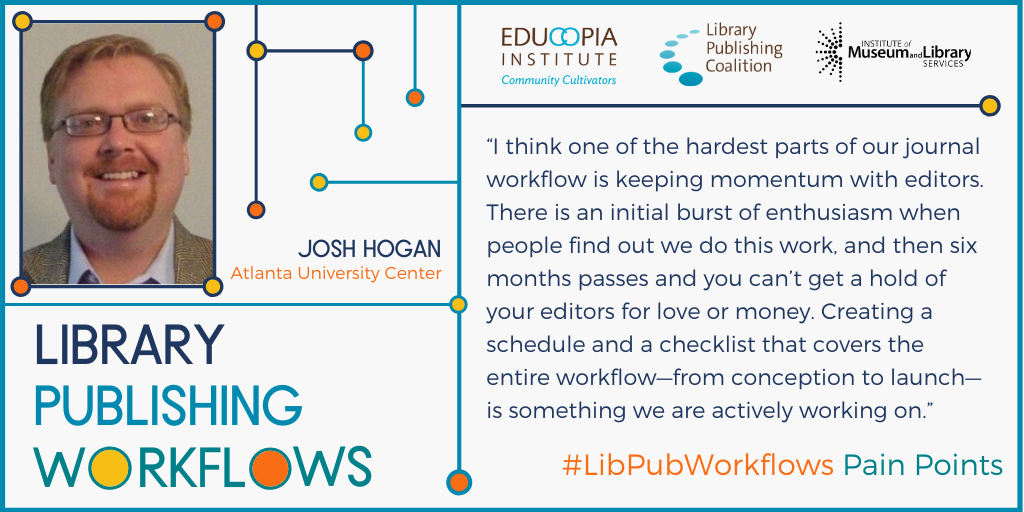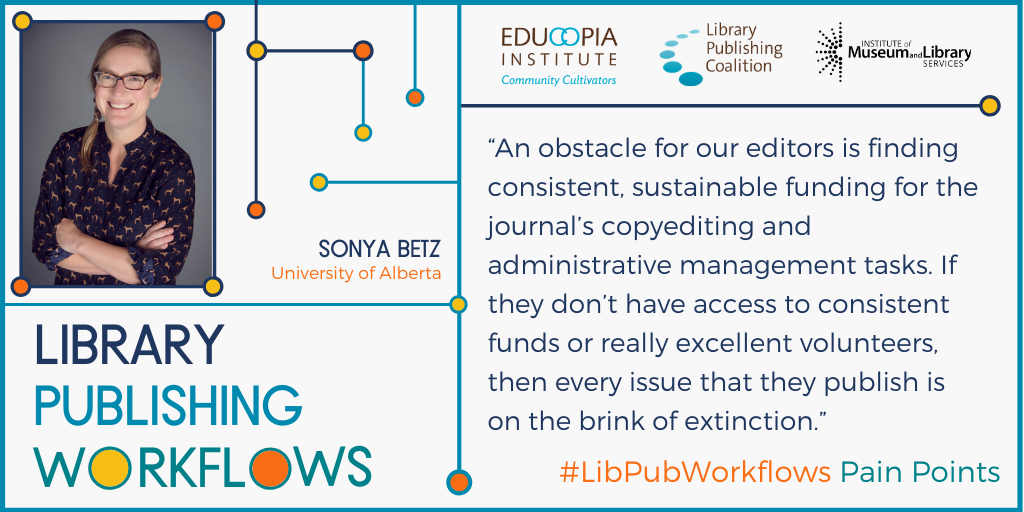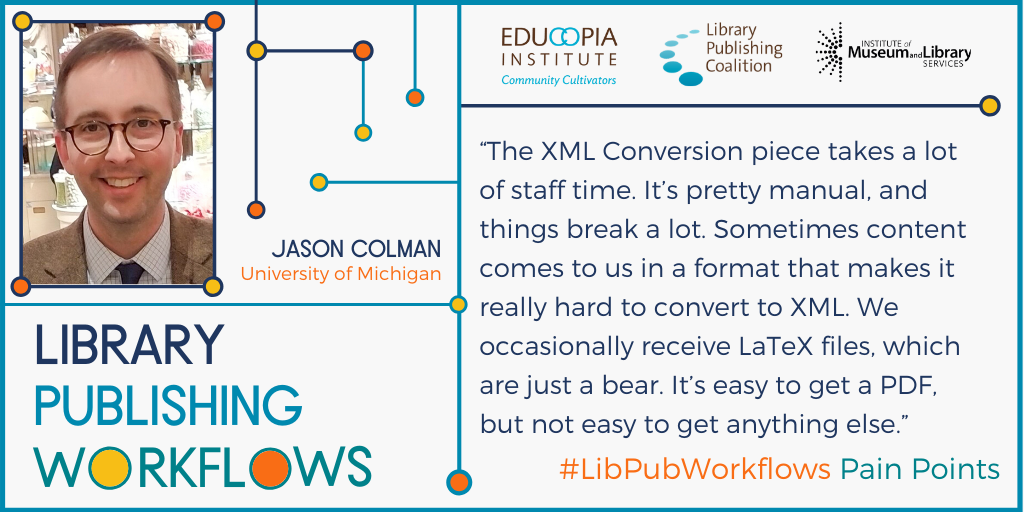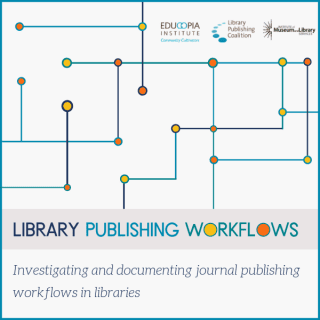
2019-2022
Library Publishing Workflows
Investigating and documenting journal publishing workflows in libraries
Quick Links to Project Deliverables
- Library Publishing Workflows blog posts (all)
- Library Publishing Workflows Pain Points blog series
- Library Publishing Workflows Preliminary Findings (Poster & Video)
- “Modeling library editorial workflows to promote open publication of scholarly journals: The American Library Publishing Workflows project.” (English language preprint)
- Libraries and the importance of infrastructure (Recording)
- Working through the Pain: How Library Publishers are Learning from Workflow Documentation, (Recording)
- Workflow Framework Blog Post
- Our workflows, our values: LPW Partner Panel Discussion (Recording)
- Workflow Packets (see below for access to each partner’s individual workflow packet)
- Workflow Diagram—All Partners (see below for access to each partner’s individual workflow diagram)
- Documentation & Reflection Tools
Introduction
Educopia Institute, the Library Publishing Coalition (LPC) and 12 partner libraries are embarking on a two-year project to investigate, synchronize, and model a range of workflows to increase the capacity of libraries to publish open access, peer-reviewed scholarly journals. Most library publishers have developed services in response to local needs, and initial workflows are generally home-grown, varied, and idiosyncratic. This represents a missed opportunity for comparative analysis and peer learning; it also yields frequent omissions of crucial workflow steps, such as contributing metadata to aggregators (essential for discovery and impact) and depositing content in preservation repositories (necessary for a stable scholarly record). The workflow model envisioned in this project will help libraries provide a strong alternative to commercial publishing for a wider range of journals, representing a significant advance in the development of open and academy-owned scholarship.
Project Outputs
1. Library Publishing Workflows blog posts
- Meet the Library Publishing Workflows Team (September 2019)
- Meet the Library Publishing Workflows Advisors (October 2019)
- Meet the Library Publishing Workflow Project Partners (October 2019)
- Workflow Diagram Software Options (February 2021)
2. Library Publishing Workflows Pain Points blog posts (August-November 2020)
The Library Publishing Workflows Pain Points series features reflections from our Library Publishing Workflows team and partners on the challenges publishers face in implementing, running, and sustaining their library publishing workflows.
- Library Publishing Pain Points—Quality Control by Vanessa Gabler
- Library Publishing Pain Points—Funding by Sonya Beta
- Library Publishing Pain Points—Scaling Up by Joshua Neds-Fox
- Library Publishing Pain Points—Aging Infrastructure by Jason Colman
- Library Publishing Pain Points—Sources of Chronic Pain Points by Brandon Locke
3. Library Publishing Workflows Preliminary Findings (Library Publishing Forum, May 2020)
The Library Publishing Workflows Project Manager Brandon Locke presented a poster that analyzed the pain points reported by our partners at the 2020 Library Publishing Forum. Both the poster and video presentation are available.
4. “Modeling library editorial workflows to promote open publication of scholarly journals: The American Library Publishing Workflows project.” (August 2019)
The Library Publishing Workflow team (Locke, Schlosser, and Skinner) published an article about the project in the French language journal I2D – Information, données & documents. The English language pre-print is available on the Educopia website.
5. Libraries and the importance of infrastructure (NISO Plus, February 2020)
Project Manager Brandon Locke discussed Library Publishing Workflows and other Educopia projects in the context of library infrastructure on the Libraries and the importance of infrastructure panel at NISO Plus 2021.
6. Working through the Pain: How Library Publishers are Learning from Workflow Documentation (Library Publishing Forum, May 2021)
Brandon Locke (Educopia Institute), Jennifer Beamer (Claremont Colleges Library), Sonya Betz (University of Alberta Library), and Joshua Neds-Fox (Wayne State University Libraries) discussed the lessons they’ve learned from the LPWorkflows project so far, and how the process of documentation has impacted their program’s approach at Library Publishing Forum 2021. The recording of their panel, Working through the Pain: How Library Publishers are Learning from Workflow Documentation is now available!
7. Workflow Framework Blog Post (October 2021)
The Library Publishing Workflows team developed a Workflow Framework to help library publishers understand the broader context of library publishing and compare different workflows.
8. Our workflows, our values: LPW Partner Panel Discussion (October 2021)
In the Our workflows, our values recorded panel conversation, representatives of six of our partner libraries—Jennifer Beamer (Claremont Colleges Library), Paige Mann (Armacost Library (University of Redlands), Justin Gonder (California Digital Library), Michelle Wilson (Columbia University Libraries), Sonya Betz (University of Alberta Library), and Vanessa Gabler (The University Library System at the University of Pittsburgh)—grapple with the big questions raised by creating and documenting publishing workflows, including: “What role do library publishers play in ensuring high quality fact-based scholarly publishing,” “What role do they play in social justice and increasing access to means of production,” and “What is the role of library publishing in the Open Access movement and scholarly communications models?”
9. Workflow Packets (October 2021)
The Library Publishing Workflows team worked with project partners to document one or more paths that a single journal article or issue may take through the publishing process. These workflow packets include all of the workflow documentation created for an institution, including a Program Profile, Workflow Diagram(s), and Detailed Workflow(s).
- University of Alberta Library Workflow Packet
- Robert W. Woodruff Library (Atlanta University Center) Workflow Packet
- California Digital Library Workflow Packet
- Claremont Colleges Library Workflow Packet
- Columbia University Libraries Workflow Packet
- Ames Library (Illinois Wesleyan University) Workflow Packet
- University of Michigan Library (Michigan Publishing) Workflow Packet
- Pacific University Libraries Workflow Packet
- The University Library System at the University of Pittsburgh Workflow Packet
- Armacost Library (University of Redlands) Workflow Packet
- University Libraries at Virginia Tech Workflow Packet
- Wayne State University Libraries Workflow Packet
10. Workflow Diagrams—All Partners (October 2021)
This packet includes all 13 journal publishing workflow diagrams from our 12 partner institutions. Workflow diagrams are graphic representations of the major workflow steps that show the path(s) that a journal issue or article will follow, starting with the moment the library first engages with it, through to the end of active library work.
10. Documentation and Reflection Tools (March 2022)
These tools have been informed by the work we did with those partner libraries, and the experience and feedback the participants gave throughout the project. We encourage you to read through that documentation to get a feel for what those institutions’ documentation looks like, keeping in mind that yours may end up looking a bit different than any of the others.
We have created two types of tools: documentation tools and reflection tools. The documentation tools will guide you in the work of describing your current publishing workflow, while the reflection tools will help you use that documentation to reflect critically on your practice in a number of areas.
- Documenting Your Journal Publishing Workflow
- Diagramming Your Journal Publishing Workflow
- Are Our Values Reflected in Our Workflow?
- Is Our Work Sustainable and Scalable?
- What Standards and Policies Are We Using?
- What Other Documentation Do We Need?
Project Activities
We will form a cohort of libraries engaged in journal publishing and work with them to document and improve their publishing workflows. This work will be accomplished via peer learning, one-on-one interviews, and an in-person meeting. We will analyze the data gathered in these settings to identify opportunities for high-impact interventions in publishing workflows and ‘pain points’ that could be addressed in follow-on work.
Deliverables for this project include:
- 12 visualizations representing the journal publishing workflows of each partner library
- a workflow template and guidance documentation for libraries seeking to map their workflows
- a free set of recorded discussions on journal publishing workflows in libraries
- presentations at three conferences
- a final report that will include lessons learned in working with the partner cohort to improve their workflows and conclusions drawn from analyzing the workflow data collected during the project, including next steps for building journal publishing capacity in libraries
Learn More
Contact Melanie Schlosser <melanie@educopia.org> with questions about the project. For the latest project news, see the LPC blog or sign up for the LPC quarterly newsletter.
Acknowledgements
This project was made possible in part by the Institute of Museum and Library Services LG-36-19-0133-19

